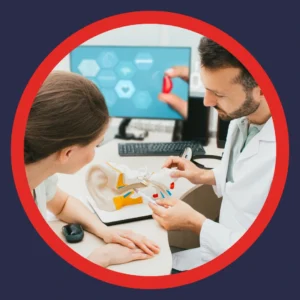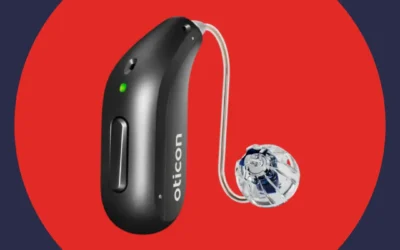When you search best audiologist near me, you’re not just looking for a clinic — you’re looking for a partner in your long-term hearing health. This choice affects far more than your ears. The right audiologist can help you stay socially connected, protect your mental sharpness, and enjoy the richness of life’s sounds.
Hearing loss is about more than missed words. Untreated, it can lead to frustration, isolation, and even cognitive decline. In fact, research has linked hearing care to a reduced risk of dementia, making your choice of provider a decision that impacts your overall well-being.
So, how do you know when you’ve truly found the right one? The best audiologists share certain traits, credentials, and patient care philosophies. They help you navigate treatment options, stay on top of technology, and keep your hearing at its best. This guide will walk you through everything you need to know — from what qualities to look for to how to prepare for your first appointment.
Why Your Choice of Audiologist Shapes Your Hearing Future
Your hearing connects you to people, activities, and the world around you. When it declines, so can your confidence, relationships, and enjoyment of life. Choosing the best audiologist means choosing someone who understands both the technical and personal sides of hearing care.
A skilled audiologist doesn’t just fit you with devices. They evaluate your lifestyle, listen to your concerns, and recommend solutions that keep you active and engaged. They also stay informed about new advances, like AI-driven sound processing and wellness-tracking hearing aids. You can see some of the latest options in Discover the Amazing Features Available in Hearing Aids Today.
Six Qualities the Best Audiologists Share
While degrees, certifications, and technology matter, the personal qualities of an audiologist often determine how comfortable, confident, and satisfied you’ll feel during care. These traits transform a routine appointment into a positive, productive experience that keeps you coming back when you need help.
Compassion
Compassion means more than a friendly greeting — it’s a genuine concern for your comfort, feelings, and long-term well-being. A compassionate audiologist takes the time to understand your lifestyle, frustrations, and goals before recommending any tests or treatments. If you’re worried about wearing hearing aids at work or in public, they listen without judgment and help you find discreet, comfortable solutions. They acknowledge the emotional side of hearing loss and remind you that you’re not alone. Many patients say that feeling “heard” by their provider is just as important as hearing better afterward.

Strong Communication Skills
The best audiologists don’t bury you in technical jargon. They explain what’s happening during every step — from the initial ear exam to the hearing aid fitting — so you feel informed, not overwhelmed. If your hearing test shows a loss, they explain it clearly, often using visuals or simple comparisons. For example, they might say, “This dip here in your results is why certain high-pitched voices sound muffled to you.” This clarity builds trust and helps you feel confident in your treatment plan.
Problem-Solving Skills
No two cases of hearing loss are identical. A skilled audiologist uses creativity and critical thinking to solve challenges that standard approaches can’t. If your new hearing aids sound tinny in restaurants but great at home, they experiment with adjustments, noise reduction settings, or accessories until they work for every environment. They don’t stop until you’re satisfied, and they’re willing to think outside the box — even collaborating with other medical professionals when needed.
Time Management
Efficient time management benefits everyone. A punctual audiologist minimizes wait times and keeps your appointment focused, yet thorough. They know how to stay on track while still answering your questions and addressing your concerns. This respect for your time is especially valuable if you have a busy schedule, mobility challenges, or limited availability to attend appointments. Well-managed time also means follow-ups are handled promptly, keeping your hearing care progress moving forward without unnecessary delays.
Organization Skills
Strong organization ensures your hearing health history is well-documented and easily accessible. An organized audiologist can quickly compare past and present test results to spot changes early. They follow standardized testing protocols so no detail is overlooked, and they maintain orderly records of your device settings, warranty information, and repair history. This attention to detail prevents errors, reduces frustration, and helps them deliver consistent, high-quality care every time you visit.
Patience
Hearing care can be an adjustment process, especially if you’re new to hearing aids or need time to adapt to new sounds. The best audiologists give you the time you need to feel comfortable. They don’t rush explanations, and they’ll repeat instructions as many times as it takes. If you struggle with inserting your device or pairing it to your phone, they walk you through it step-by-step until you feel confident. Patience builds a safe, supportive environment where you can ask any question without feeling embarrassed.
When these six qualities come together, they create a provider who not only improves your hearing but also makes the entire experience comfortable, reassuring, and effective. That combination is what truly sets the best audiologist near me apart from the rest.
How to Spot These Qualities During Your First Visit
When you meet a new audiologist for the first time, you can often tell within minutes whether they have the traits that matter most. Here’s a quick checklist to help you evaluate:
- They greet you warmly and show interest in your concerns instead of rushing into the exam.
- They explain each step of the process in language you understand, without overloading you with jargon.
- They ask follow-up questions to clarify your needs rather than assuming they know the answer.
- They adjust their approach if something isn’t working during testing or demonstrations.
- They stay on schedule while still giving you time for questions.
- Their workspace is neat and organized, with equipment ready to use and records easy to access.
- They encourage you to speak up about your comfort level and are willing to repeat instructions without frustration.
If you leave feeling understood, informed, and confident that your needs were taken seriously, you’ve likely found someone who embodies the qualities of the best audiologist near me.
Professional Credentials and Experience to Look For
When evaluating the best audiologist near me, start with qualifications. Look for:
- A Doctor of Audiology (Au.D.) or Ph.D. in audiology.
- State licensure and compliance with all professional regulations.
- Certification from the American Speech-Language-Hearing Association (ASHA) or similar bodies.
- Ongoing continuing education to stay current with technology and treatment options.
Experience is equally important. An audiologist who regularly fits hearing aids, manages tinnitus, and treats balance disorders will have the skills to handle your unique needs with confidence.
Understanding Hearing Loss and Treatment Options
Knowing the basics will help you ask the right questions during your visit. Hearing loss comes in three main types:
- Sensorineural: Damage to the inner ear or auditory nerve, often permanent but treatable with hearing aids or implants.
- Conductive: Blockages or middle-ear issues that can sometimes be corrected medically or surgically.
- Mixed: A combination of both types.
Treatment options include hearing aids, cochlear implants, and assistive listening devices for specific situations. Your audiologist will tailor recommendations to your hearing profile and lifestyle. If you’re unsure what to ask, review Top 9 Questions to Ask During a Hearing Consultation before your visit.
Red Flags to Watch Out For
Not all providers are equal. Warning signs include pushy sales tactics for a specific brand, lack of clear pricing, minimal testing that focuses only on selling devices, and unprofessional communication. The best audiologists focus on your needs, not just a quick sale.

Insurance, Financing, and Accessibility: Making Great Hearing Care Possible for Everyone
The best audiologist is one whose care you can actually access. That starts with understanding insurance coverage. Some plans fully cover hearing exams but not devices, while others offer partial hearing aid benefits. Certain insurers require a referral from your primary care provider before they’ll approve services. The right clinic will help you navigate these rules and avoid surprise bills. Learn more about coverage in Hearing Aid Insurance Benefits.
If insurance doesn’t fully cover your devices, ask about financing options. Many practices offer interest-free monthly plans or accept Health Savings Accounts (HSA) and Flexible Spending Accounts (FSA). These can make premium technology accessible without causing financial strain.
Accessibility also means the clinic’s services fit into your life. Look for flexible scheduling — early mornings, evenings, or even virtual follow-ups for adjustments. Consider location convenience, parking, and public transit access. For those with mobility concerns, ask about wheelchair-friendly spaces and on-site assistance. Even small conveniences like in-house repairs or same-day service can keep your hearing care on track.
How to Prepare for Your First Appointment: Setting Yourself Up for Success
A little preparation helps you get the most from your visit. Keep a hearing journal for a week or two before your appointment. Write down situations where you notice difficulty — phone calls, group settings, or noisy restaurants. This helps your audiologist match solutions to your real-world needs.
Bring medical history and past hearing tests, along with a list of medications, since some drugs can affect hearing. If hearing loss runs in your family, share that information. It can help your provider identify patterns or hereditary factors.
Make a list of questions you want answered, from hearing aid features to maintenance tips. If you’re unsure where to start, review Top 9 Questions to Ask During a Hearing Consultation for ideas.
Whenever possible, bring a companion. They can offer insights about your hearing challenges, help remember details, and provide support while you process recommendations.
If you haven’t had a recent evaluation, consider a no-cost option — Where Can I Get a Free Hearing Test Near Me? can point you in the right direction.
Building a Strong, Ongoing Partnership With Your Audiologist
Your relationship with your audiologist doesn’t end after your first fitting — it begins there. Treat them as a long-term partner in your hearing health.
Schedule regular check-ups to ensure your devices are performing optimally. Even small adjustments can improve clarity and comfort. If something doesn’t feel right, speak up immediately — your feedback is essential for fine-tuning your experience.
Stay curious about new technology. Innovations like AI sound processing, rechargeable batteries, and health tracking features are making hearing aids smarter and more user-friendly every year. Your provider can advise whether an upgrade or software update would benefit you.
Use your audiologist as a resource for preventive hearing care. They can provide custom ear protection for loud environments, educate you on safe listening habits, and monitor your hearing for changes. By working together, you can protect your hearing and adapt to changes over time.

Ready to Hear Your Best? Let’s Find the Right Fit Together
Finding the best audiologist near me means finding someone who listens to your story, explains options clearly, and designs solutions that work for your lifestyle. Online reviews can help you find the right provider. But meeting your audiologist is the only way you can know.
Your hearing health shapes how you connect with the world. Don’t settle for less than a partner who is as invested in it as you are. Contact American Hearing today to start your journey toward clearer, more confident hearing.



